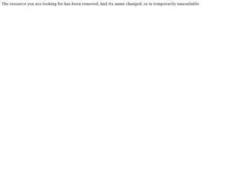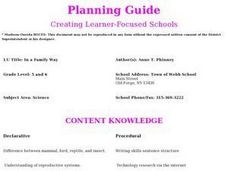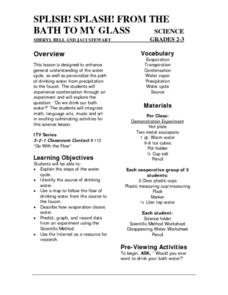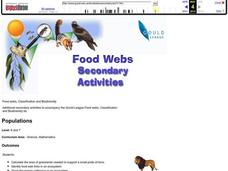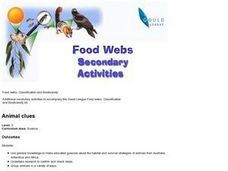Curated OER
Testing the Hypothesis
Students create and conduct various experiments to determine the origin of a family artifact, and then determine whether their results were successful. Students summarize their results and evaluate whether their hypotheses were correct.
Curated OER
Linnaeus' Latin Lingo
Students use Latin and Greek words to figure out species names for whales.
Curated OER
In a Family Way
Students research a rare species of animals that are a step away from the well known animals of our zoos. They create a mobile which displays the geography, habits, population and habitat of the animals. They draw a picture.
Curated OER
Biology: Howler Monkeys Tell All
Students examine a PBS special about howler monkeys as an introduction to scientific forensic investigative methods. In groups, they conduct a host of experiments containing clues which point to discovery. By challenging assumptions,...
Earth Day Network
Staying Green While Being Clean
Clean up the environment with a lesson that focuses on replacing hazardous cleaning supplies with green, environmentally-friendly products. Using a dirty patch of surface as a control area, kids clean other parts of various surfaces...
Curated OER
Splish! Splash! From the Bath to my Glass
An excellent lesson on the water cycle! In it, learners should gain a general understanding of the water cycle, along with how water first falls as precipitation, then ends up coming out of our faucets. This lesson nicely integrates...
Curated OER
Bubble and Boyle
Even middle schoolers still enjoy experimenting with bubbles! They execute a series of experiments enabling them to distinguish between convex and concave surfaces, explore the properties of buoyancy, surface tension, and density,...
Curated OER
Lab Experiments in Nutrition
Looking for authentic hands-on nutritional experiments? High schoolers will perform experiments to test for the presence of vitamin C in several solutions as well as the effect of caffeine on Daphnia. They will also consider the...
Curated OER
Turning the Tide on Trash: Marine Debris Curriculum
Seven pages of fascinating reading on marine debris preface the activities in this lesson plan. Four different activities are employed to simulate how the debris is distributed in the ocean and along beaches. Early ecology learners...
Curated OER
Adaptations
Students identify features of animals that enable survival in particular environments and group animals on the basis of their similarities. They compare and contrast features of groups of animals.
Curated OER
Populations
Young scholars calculate the area of grasslands needed to support a small pride of lions. They also identify food web links in an ecosystem and trace the energy pathways in an ecosystem.
Curated OER
Animal clues
Fifth graders use general knowledge to make educated guesses about the habitat and survival strategies of animals from Australia, Antarctica and Africa. They research to confirm and check ideas and group animals in a variety of ways.
Curated OER
Survival
Young scholars identify characteristics of Australia, Africa and Antarctica and compare and contrast them to each other. They work together to identify adaptations that animals have used to survive. They also practice classifying animals.
Curated OER
Powdery Mildew Fungi: Classification and Ecology
Students use a written key or illustrated key to identify fungi on plant leaves into its genus based on sexual or asexual reproduction, host range diversity, and host-parasite relationships.
Curated OER
Out of Sight, Out of Mind
Pupils analyze and graph the waste created in a typical lunch period. They increase awareness of various types of garbage students create during a lunch period. They construct and label a graph of lunch waste. They brainstorm...
Other popular searches
- Scientific Method Worksheet
- Scientific Method Activities
- Scientific Method Variables
- The Scientific Method
- Scientific Method Hypothesis
- Six Step Scientific Method
- Scientific Method Lab
- Scientific Method Powerpoint
- Basic Scientific Method
- Scientific Method Botany
- Scientific Method Lab Report
- Scientific Method Vocabulary


